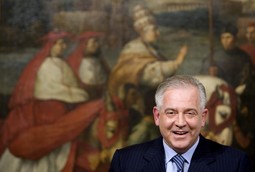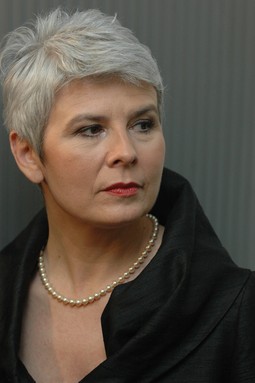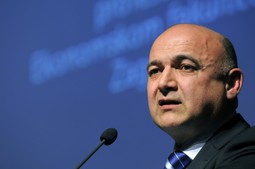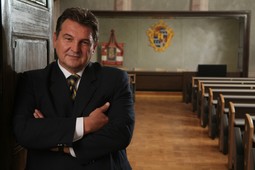Published in Nacional number 697, 2009-03-24
Sanader to decide on nomination after the summer
PRIME MINISTER IVO SANADER would have 30 percent of the vote from the get go, and with the support of smaller parties and the HDZ's financial clout, would have a good chance of becoming Mesic's successor
 In spite of all the problems his administration faces, Ivo Sanader would, of he was to run for the presidency, have an advantage over any other competitor.Ivo Sanader recently asked the HDZ presidency to delay the decision on the ruling party's presidential nominee to the end of August or the first half of September. Until then no HDZ member is allowed to publicly discuss the possible nominees, but one thing is clear: the Prime Minister is the only real candidate, and a debate will ensue in the autumn on other candidates only if he explicitly refuses to enter the race to succeed Stipe Mesic. Two high-ranking Croatian Democratic Union (HDZ) officials confirmed this for Nacional last weekend.
In spite of all the problems his administration faces, Ivo Sanader would, of he was to run for the presidency, have an advantage over any other competitor.Ivo Sanader recently asked the HDZ presidency to delay the decision on the ruling party's presidential nominee to the end of August or the first half of September. Until then no HDZ member is allowed to publicly discuss the possible nominees, but one thing is clear: the Prime Minister is the only real candidate, and a debate will ensue in the autumn on other candidates only if he explicitly refuses to enter the race to succeed Stipe Mesic. Two high-ranking Croatian Democratic Union (HDZ) officials confirmed this for Nacional last weekend.
This is an important political issue, because it means that Sanader is considering the presidential nomination. And while potential HDZ nominees have been announced over the past few months, such as Dragan Primorac, Andrija Hebrang, Ivan Simonovic, and for a while Nadan Vidosevic and Jadranka Kosor – the dominant opinion in the leadership of the ruling party is that only Sanader has a realistic chance of winning, but the Prime Minister has decided to wait it out another half year, to make his decision on whether to run for the post of President of the Republic based on economic and political developments.
And while his Government faces a number of problems, from the recession and poor economic results to a delay in the negotiations with the EU, Ivo Sanader would be the favourite if he ran in the elections. He has the 30% HDZ electorate behind him, and a share of voters from the political centre and right, which has yet to field a single relevant candidate. Besides perhaps Stipe Mesic, he has without a doubt the most convincing media presence, so that most of his spin goes undisputed, whether it be the warped theory that the global crisis is to blame for domestic problems, or that his cabinet is fighting corruption, even if there are suspicions concerning the actions of officials such as Luka Bebic, Berislav Roncevic and Jadranka Kosor.
And, if he does run in the elections, Sanader can count on the almost limitless financial backing of his campaign. At the last parliamentary elections the HDZ spent more than all other parties combined on commercials, and the analysis of our source in the top HDZ echelons is that if Sanader runs no one will give a moment's though to money. With a broad network of party infrastructure, covering every municipality in Croatia, and the support of the HSS, HSLS and some other smaller parties, Sanader would have a good chance of becoming Mesic's successor at the post of President.
The problem is that this opens the issue of who would take over the leadership of the HDZ and the Government. Sanader's leadership style is authoritarian, he has eliminated his opponents in the past, and the vow of silence in the HDZ concerning the presidential elections is indicative of the level of democracy within the party. The only member of Government allowing themselves publicly exposure for the moment is Ivan Suker, but the example of Damir Polancec, who back in mid 2008 figured as Sanader's successor, demonstrates the speed in which political careers are expended.
And again, leaving Government in a year of crisis could be seen as a flight from responsibility. There are no signs that the situation will improve significantly by the time the presidential elections are held in early 2010, and Sanader would, in these circumstances, enter the campaign as an unsuccessful Prime Minister, so it is an open question as to whether he would hold on to the advantage the HDZ s counting on. But at this moment Sanader is the only serious presidential candidate from the ruling party, and this is something that they have to consider seriously both in the opposition and within the HDZ itself.
In the process there has been of late more and more talk within the HDZ of yet another reserve option. At issue is interior minister Tomislav Karamarko, who has to date not been discussed in the frame of the presidential elections, but they have confirmed in the HDZ that they are considering him. Understandably, the "Karamarko Project" is only in the initial phase, but in the ruling party they say that the interior minister is not indisposed to the nomination, and he allegedly has the discreet support of Mesic, with whom he has worked closely since as far back as 1990. Objectively, Karamarko is for the moment only a  DEPUTY PRIME MINISTER JADRANKA KOSOR is no longer among Sanader's favourites for the presidential nominationpotential candidate and one of those being considered, and could succeed only if many things came together, from Sanader's backing down and his winning the support of the HDZ, to some spectacular police operations in combating organised crime.
DEPUTY PRIME MINISTER JADRANKA KOSOR is no longer among Sanader's favourites for the presidential nominationpotential candidate and one of those being considered, and could succeed only if many things came together, from Sanader's backing down and his winning the support of the HDZ, to some spectacular police operations in combating organised crime.
The word on Karamarko does not mean that Dragan Primorac has abandoned his presidential ambitions, but he too has decided to wait it out until Sanader makes his call. If Sanader enters the presidential race, Primorac will once again do the campaigning among Croatians in Bosnia & Herzegovina, while he would otherwise put forth his own nomination to the HDZ presidency.
It is certain that Andrija Hebrang will not do so, who has influence in the HDZ's right wing, but has assessed that he could divide the party and, on the way, eliminate himself from top politics. Jadranka Kosor is no longer numbered among Sanader's favourites, and no one is even considering Lino Cervar, who has in various company said that he could be the President of the Republic. Indicative of what the feeling in the HDZ is of that outcome is the fact that nobody has given serious consideration to Cervar, besides, perhaps, Cervar himself.
Judging by the atmosphere among the close associates of Nadan Vidosevic, the head of the Croatian Chamber of Economy (CCE) is sure to run. Vidosevic is convinced of the accuracy of surveys that have him as the favourite, and has of late been advocating the theory that his detachment from the HDZ has in fact increased his chances. The economic crisis will deepen and the burden of responsibility will be on Sanader – feels Vidosevic – and in these circumstances Croatian voters will opt for the nominee that can formulate a strategy for economic recovery. His frequent contacts with numerous influential business people are not unimportant, from whom he expects financial backing, and public support of his presidential campaign.
Vidosevic is also counting on Mesic's support, since the President has on several occasions said that he can imagine the head of the CEE as his successor. On the other hand, one cannot ignore the potential obstacles to his ambitions, especially the many warnings concerning the assets Vidosevic has accumulated. If he enters the campaign these issues will be reopened, but even more radically, and it has not been ruled out that it could cause irreparable damage.
Until recently Ivica Mudrinic had aired his ambitions, but the feeling in the business community is that the Croatian Telecom boss will not be a presidential candidate. He has a very solid position in the business world and would, if he were to run, be fighting for the same voters Nadan Vidosevic wants to win over. The result would be the loss of both and that is why Mudrinic is close to a decision to get involved only by backing one of the candidates.
If an unexpected name does not emerge, the left-of-centre has two serious candidates, these being Ivo Josipovic and Radimir Cacic. And while Ljubo Jurcic will probably also put forward his nomination in mid April there are only minimal prospects that Zoran Milanovic will propose him and the members of the SDP  LJUBO JURCIC will put forward his nomination in April, but has little chances of being supported by Milanoviccentral committee choose him as the presidential candidate of the Social Democratic Party. Josipovic has already established himself in several interviews to leading media houses, and in surveys is getting about the same support as Sanader and Vidosevic, and within the party Milanovic and a majority of the more prominent members support him.
LJUBO JURCIC will put forward his nomination in April, but has little chances of being supported by Milanoviccentral committee choose him as the presidential candidate of the Social Democratic Party. Josipovic has already established himself in several interviews to leading media houses, and in surveys is getting about the same support as Sanader and Vidosevic, and within the party Milanovic and a majority of the more prominent members support him.
Jurcic is convinced that he can catch up with his opponent and is now putting the finishing touches on the team that will lead his campaign. This move has caused no end of indignation in the SDP brass, but does suggest that Jurcic will, if the social democrats opt for Josipovic, perhaps enter the presidential race as an independent candidate.
From recent conversations with some leading SDP officials the reasons for Josipovic's lead are becoming evident. He is, first of all, the prototype of a serious and calm politician who has not made a single significant gaffe in his career to date. Nacional's sources explicitly rejected accusations according to which Ivo Josipovic, while at the helm of ZAMP (the musicians' royalties organisation), reaped material benefit. "He is clean in that regard, he did everything by the rules valid in the European Union and the attacks against him as unfounded," they believe in the SDP.
It remains to be seen whether an investigation into ZAMP could hurt his chances, or whether it will pass relatively simply, as they hope in the Social Democratic Party.
One of the chief arguments in the Josipovic camp is that he will pick up voters to the left who are predominant in Zagreb, the Primorje region and in Istria. This proposition was put forward off the record by a very high-ranking member of the SDP leadership, who was in early March still confident that the IDS would back their candidate. But a surprise combination surfaced then with Radimir Cacic figuring as the representative of the strongest regional party in Croatia.
Radimir Cacic has already made a number of moves towards announcing a presidential nomination, First he backed out of the race for Zagreb Mayor – even though he never actually explicitly said that he would oppose Milan Bandic – and has of late tried to win the support of parties whose candidates will not take  RADIMIR CACIC is sure to run regardless of the chances observers give himpart in the presidential campaign. And so some twenty days ago Istria County Prefect Ivan Jakovcic, to the general surprise of the Social Democrats, announced that the IDS would probably back Cacic, and not Ivo Josipovic. This is a 180-degree turnaround in his position, as the SDP has not put forward a candidate for the post of county prefect in Istria for the upcoming local elections, but rather backed Jakovcic, and in return it was expected that the IDS would stand behind Josipovic at the presidential elections.
RADIMIR CACIC is sure to run regardless of the chances observers give himpart in the presidential campaign. And so some twenty days ago Istria County Prefect Ivan Jakovcic, to the general surprise of the Social Democrats, announced that the IDS would probably back Cacic, and not Ivo Josipovic. This is a 180-degree turnaround in his position, as the SDP has not put forward a candidate for the post of county prefect in Istria for the upcoming local elections, but rather backed Jakovcic, and in return it was expected that the IDS would stand behind Josipovic at the presidential elections.
The SDP describes Jakovcic's move as an unprincipled violation of their agreement, but believe that things will fall in place over the summer. "Both Cacic and Jakovcic are tongue in cheek and are not capable of long term collaboration. In Istria the HNS cannot cross the threshold to get into the county assembly, while the IDS is concerned as they are no longer the strongest party in the county, and Jakovcic thinks that he will regain this position with Cacic's help. They both forget that they are significantly weaker than we are and that they are working to their own detriment with these kinds of policies," feels this member of the SDP leadership.
The always-ambitious Radimir Cacic has a different opinion. In several public opinion polls he has won about as much support as Nadan Vidosevic, which is why he believes that he would be the sure winner in a run-off vote. And just like Josipovic he wants to draw the traditional base of left oriented voters in Istria, and at least two recent decisions have demonstrated aspiration towards a part of the right oriented population. In Osijek HNS member Ivan Vrdoljak, number three in the party hierarchy, has decided to enter a coalition with Branimir Glavas. And while Vesna Pusic opposed the coalition in the wake of media criticism, it is a fact that Vrdoljak would never make that kind of decision without consulting Cacic. In Zagreb Cacic worked out a verbal deal with representatives of the HDZ-HSLS-HSS coalition that the HNS would join an anti-Bandic coalition in city council. Besides, however much he criticises the HDZ, he has never totally ruled out the possibility of a coalition at the national level.
On the other hand there are few who believe he stands any chance. Last week the ambassador of one of the world's leading countries described Cacic as "non-electable" in a conversation with Nacional’s reporter. At the President's Office the story is that, regardless of who the HNS candidate will be, the only question is whether they would win 5 or 6 percent of the vote, while in the SDP they do not for the moment feel that Ivo Josipovic will have too much of a problem with Cacic.
Related articles
Sanader’s eight fear SDP — Won’t bring down Government
Despite forecasts that he would, former Croatian Prime Minister Ivo Sanader, who recently took his seat in Parliament, will not work from the house… Više
Latest news
-
28.10.2010. / 14:15
'A profitable INA is in everyone's interest'
-
28.10.2010. / 09:38
Sanader’s eight fear SDP — Won’t bring down Government
-
21.10.2010. / 15:02
Interior Ministry turned a blind eye on Pukanic assassination
-
20.10.2010. / 09:34
Barisic could bankrupt HDZ




